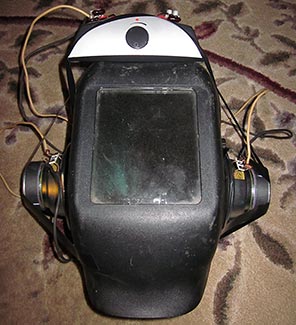|
|
Home | High-End Audio Reviews | Audiophile Shows | Partner Mags | Hi-Fi / Music News |
|
|
|
30 Years Of Service To Music Lovers |
|
|
April 2012

Sensory Management Headphones
JUST UPDATED! Ghost of J. Gordon Holt Seen!!!
Article By Jeff Poth
Difficulty Level


Hi, my name is Jeff Poth and some of you may remember me from one my articles I wrote for Enjoy the Music.com about two years ago titled Etymotic ER6i in-ear monitors, go stick it in your ear! The Etymotic ER6i were a terrific headphone, but I felt like much of their strength, and weakness, was in the isolation they provided. The low noise level, great dynamics, and clean sound were very appealing, but I couldn’t use them at work, as communicating with co-workers required repeated removal and reinsertion, and people kept appearing seemingly out of nowhere to wave me out of my music/work trance. Two years later, I have a Sr. in front of my title, and the same cubicular existence. Something had to give.
Accordingly, I set about building a better mousetrap. Or more
specifically, headphones that would isolate me without totally disconnecting me.
I would need dynamics to come from somewhere else other than the extremely close
proximity to the eardrum, and all-day comfort. To achieve this, I chose to use
speakers, spaced somewhat away from the ear, but not sealed. The diaphragm size
is a huge increase over all but the biggest headphones on the market (read: Stax
and a few other esoterics), which should allow for plentiful dynamics and
output. I would need full-range performance from a single full-range driver, and
the speakers would have to have acoustic loading that matched on either side of
the diaphragm to keep even order harmonic distortion low, despite being in an
odd spot near, but not over, the ears (to allow a modest amount of environmental
sound).
To achieve this balance, I searched high and low to find the
right part. Eventually I got some Sony full range speakers with a very small
opening in the rear frame, to keep the constricted airflow even on the front and
the rear of the diaphragm:

As you can see, the only opening is a small window right by the terminals. Because these are clones of the Fostex ff85k (note the shaping of the surround, flattery by imitation of Fostex’sUDR surround technology), I knew they’d perform well full-range. These Malaysian made, stamped steel frame drivers with a heavy and stiff rubber surround were just the ticket!

Now that I had the right speaker, I had to find the correct mounting method. Wooden frames proved far too uncomfortable, and attempts to find a hat that could support real speakers kept failing. Sports helmets were too cumbersome and got stifling during long listening sessions. My whole project was on the line and my options were getting very expensive until I found a solution that not only allowed me to mount the speakers solidly, but also provide some suppression of ambient light as needed. Enter the Sensory Management Headphone Rig.

I chose to use my speakers on a welding mask, powered by a low-powered Class D amplifier. When I powered them up, boy did the auditory sparks fly! The mids sizzled, the highs floated like ozone, and the bass had me opening up the valve to see just how far I could take it! Now we’re cooking with gas! The best part was that I could totally zone into the music in the dark, and simply flip the mask up when I wanted to exit my phony panacea.

To test the comfort, I wore the Sensory Management Headphones to work. Without the complete isolation of in-ears, I could hear my coworkers clearly; they seemed to be talking about me even before I sat down at my cubicle! Finally, I could have a high-fidelity in-cube experience without sacrificing professionalism!
And there you have it. The Sensory Management Headphones.
BAM!!!
EMERGENCY UPDATE!!!! This is editor Steven R. Rochlin and it was just pointed out to me via e-mail that if you look carefully enough at the facemask pictured above, you just might see the ghostly image high-end audio legend of J. Gordon Holt!!!

 High-Performance Audio Reviews
High-Performance Audio Reviews













